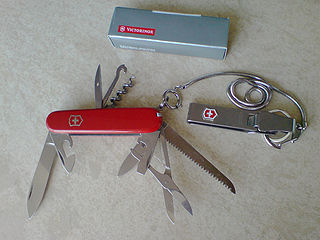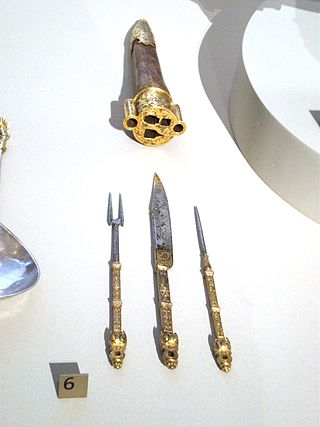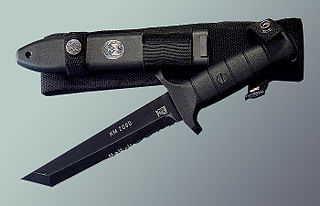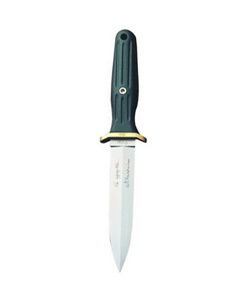
The Swiss Army knife is a pocketknife, generally multi-tooled, now manufactured by Victorinox. The term "Swiss Army knife" was coined by American soldiers after World War II after they had trouble pronouncing the German word "Offiziersmesser", meaning "officer’s knife".

Cutlery, includes any hand implement used in preparing, serving, and especially eating food in Western culture. A person who makes or sells cutlery is called a cutler. The city of Sheffield in England has been famous for the production of cutlery since the 17th century and a train – the Master Cutler – running from Sheffield to London was named after the industry. Bringing affordable cutlery to the masses, stainless steel was developed in Sheffield in the early 20th century.

Victorinox is a knife manufacturer and watchmaker based in the town of Ibach, in the Canton of Schwyz, Switzerland. It is well known for its Swiss Army knives. The Swiss Army knives made by Victorinox are made of a proprietary blend hardened steel from Germany and France. Since its acquisition of rival Wenger in 2005, it has become the sole supplier of multi-purpose knives to the Swiss army. It is the biggest manufacturer of pocket knives in the world; in addition, the company licenses its logo for watches, apparel, and travel gear.

A kitchen knife is any knife that is intended to be used in food preparation. While much of this work can be accomplished with a few general-purpose knives – notably a large chef's knife, a tough cleaver, a small paring knife and some sort of serrated blade – there are also many specialized knives that are designed for specific tasks. Kitchen knives can be made from several different materials.

All-Clad Metalcrafters, LLC is a U.S. manufacturer of cookware with headquarters in Canonsburg, Pennsylvania. The company markets its cookware to department stores and specialty stores in the United States, Australia, Canada, Germany, and the UK, along with All-Clad bonded ovenware, kitchen tools, and kitchen accessories.
Wüsthof is a knife-maker based in Solingen, Germany. Family owned for seven generations, the company's main products are mid-priced to high-end kitchen knives for domestic and professional use. Wüsthof is one of the leading manufacturers of chef's knives.

A mora knife is a small sheath knife. It is a fixed blade knife, with or without a finger guard. The term originates from knives manufactured by the cutleries in Mora, Dalarna. In Sweden and Finland, Mora knives are extensively used in construction and in industry as general-purpose tools. Mora knives are also used by all Scandinavian armies as an everyday knife.

GLOBAL is a Japanese brand of kitchen knives and accessory tools owned and manufactured by the Yoshikin factory of Japan. The Yoshikin Factory is owned by the Watanabe family and located in Tsubame, Japan.

The KM2000 is the standard combat knife of the German Bundeswehr, mostly used by the German Army. The knife is manufactured in Germany by the Eickhorn-Solingen company.

Cold Steel, Inc. is an American retailer of knives/bladed tools, training weapons, swords and other martial arts edged and blunt weapons. Founded in Ventura, California, the company is currently based in Irving, Texas after an acquisition by GSM Outdoors in 2020. Cold Steel products are manufactured worldwide, including in the United States, Japan, mainland China, Taiwan, India, Italy and South Africa.

Thiers Issard or Thiers Issard Sabatier is a French cutlery manufacturer; they are one of a number of companies using the Sabatier name. It exports a wide range of knives and straight razors to approximately thirty countries. They are viewed as one of the top cutlery firms in Europe.
Imperial Schrade Corp. was an American knife manufacturer of hunting knives, pocketknives, utility knives, and bayonets during the 20th and early 21st centuries. The consolidation of five forerunner companies, including its namesakes, the Imperial Knife Company, founded 1916, and the Schrade Cutlery Company, founded in 1904, Imperial Schrade manufactured its products in the United States and Ireland and sold through hardware stores, department stores, and on military bases. The original company's fortunes declined and in 2004 it entered into bankruptcy where all equipment and intellectual property was sold off to reimburse creditors. The name and intellectual property was bought by Taylor Brands and used for marketing purposes.

The Mercator K55K is a type of pocketknife produced in Germany since around 1867. Mercator knives were primarily produced by Hy. Kauffmann, which was operational from 1856 to 1995. The Mercator K55K knife is still produced in Germany by Mercator, now a division of Otter-Messer.

Chroma Cutlery(also known as Chroma Cnife, and styled CHROMA) is a kitchen knife-maker based in Demorest, Georgia, US, founded in 1989. Chroma also produces spice grinders, knife sharpening stones, kitchen shears and other cooking accessories. The company also manufactures products for other brands.
Böker was one of the first companies to offer ceramic knives as a featured product line.

The Applegate–Fairbairn fighting knife is a combat knife designed by Colonel Rex Applegate and William E. Fairbairn as a version of the Fairbairn–Sykes fighting knife. The blade has a similar double-edged dagger profile, but is wider and more durable. It features a different handle, made most commonly of Lexan plastic with adjustable lead weights which can change the knife's balance-point. Later models and some custom variants included weights made from pure Teflon, tungsten, stainless steel and aluminum. The blade profile was also changed from a V-grind to a convex, or "appleseed" profile. While this changed the overall effectiveness of the blade to puncture, cut and slice, it does not lend itself to be field sharpened by an inexperienced user. The current production model made by Böker in Solingen, Germany, uses a fiberglass reinforced delrin handle which solves the issues with earlier models where the handle would crack if exposed to heat.

Staub is a premium French enameled cast iron cookware and bakeware manufacturer that was originally headquartered in Turckheim, Alsace, France. The first piece, a cocotte or coquelle, was designed by Francis Staub in 1974 in a dormant artillery factory. Pieces are manufactured with cast iron covered with double-glazed enamel. The enamel coating makes the cookware rustproof, and easy to clean. Staub's cocottes have nubs on the interior of the lids, which enables condensation to collect and drip down to baste foods uniformly as they are cooking.


















